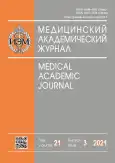Prospects of using conservative linear B-cell epitopes of influenza virus A neuraminidase for induction of cross-protective immune response
- Authors: Sychev I.А.1, Kopeikin P.M.1, Tsvetkova E.V.1,2, Shamova O.V.1, Desheva Y.A.1,2, Isakova-Sivak I.N.1
-
Affiliations:
- Institute of Experimental Medicine
- Saint Petersburg State University
- Issue: Vol 21, No 3 (2021)
- Pages: 147-151
- Section: Conference proceedings
- URL: https://journals.rcsi.science/MAJ/article/view/76614
- DOI: https://doi.org/10.17816/MAJ76614
- ID: 76614
Cite item
Abstract
BACKGROUND: Influenza is a dangerous, widespread infectious disease that takes thousands of lives during annual epidemics, and also causes significant damage to the country’s economy. The most effective means of fighting the influenza virus is vaccination of the population. Due to the variability of influenza viruses, the strain composition of influenza vaccines must be updated annually. In this regard, an urgent task is to improve the existing influenza vaccines in order to expand their spectrum of action. One of the promising approaches is the targeted induction of the humoral immune response to the conservative linear epitopes of influenza A virus neuraminidase.
AIM: This project is aimed at assessing the immunogenicity and cross-protective activity of conserved neuraminidase epitopes in order to select promising targets for the targeted design of broad-spectrum influenza vaccines.
MATERIALS AND METHODS: Peptides corresponding to linear B-cell epitopes of neuraminidase were chemically synthesized de novo. The peptides were conjugated with keyhole limpet hemocyanin. CBA mice were immunized and challenged with A/PR/8/34 (H1N1) and A/Philippines/2/1982 (H3N2) viruses at a dose of 3 LD50. The survival rate of the animals was assessed within 14 days after infection. The immunogenicity of the peptides was assessed in a standard enzyme-linked immunosorbent assay using the recombinant neuraminidase proteins of the viruses A/California/07/2009 (H1N1) and A/Hong Kong/4801/2014 (H3N2) as antigen.
RESULTS: Immunization of neuraminidase with peptides MNPNQKIITIGS and ILRTQESEC, but not DNWKGSNRP, protected mice from lethality caused by the H1N1 and/or H3N2 virus. The protective potential of the peptides correlated with the levels of antineuraminidase antibodies after immunization.
CONCLUSIONS: The presence of a cross-protective potential in two conserved linear B-cell epitopes of influenza A neuraminidase (MNPNQKIITIGS and ILRTQESEC) allows them to be recommended as a target for the development of a broad-spectrum influenza vaccine.
Full Text
##article.viewOnOriginalSite##About the authors
Ivan А. Sychev
Institute of Experimental Medicine
Author for correspondence.
Email: atheneem@yandex.ru
ORCID iD: 0000-0002-7115-5662
SPIN-code: 3333-1546
Scopus Author ID: 57202008899
ResearcherId: J-6016-2018
Junior Researcher
Russian Federation, Saint PetersburgPavel M. Kopeikin
Institute of Experimental Medicine
Email: pmkopeikin@mail.ru
SPIN-code: 9691-3484
Junior Researcher
Russian Federation, Saint PetersburgElena V. Tsvetkova
Institute of Experimental Medicine; Saint Petersburg State University
Email: evtsvetkova72@mail.ru
SPIN-code: 9221-5326
PhD (Biol.), Senior Researcher; Associate Professor
Russian Federation, Saint PetersburgOlga V. Shamova
Institute of Experimental Medicine
Email: oshamova@yandex.ru
SPIN-code: 2913-4726
Dr. Sci. (Biol.), Associate Professor, Head of the Department of General Pathology and Pathophysiology
Russian Federation, Saint PetersburgYulia A. Desheva
Institute of Experimental Medicine; Saint Petersburg State University
Email: desheva@mail.ru
ORCID iD: 0000-0001-9794-3520
SPIN-code: 4881-3786
Dr. Sci. (Med.), Associate Professor, Future Researcher; Professor of the Department of Fundamental Problems of Medicine and Medical Thechnologies
Russian Federation, Saint PetersburgIrina N. Isakova-Sivak
Institute of Experimental Medicine
Email: isakova.sivak@iemspb.ru
ORCID iD: 0000-0002-2801-1508
SPIN-code: 3469-3600
Dr. Sci. (Biol.), Head of Laboratory
Russian Federation, Saint PetersburgReferences
- Wohlbold TJ, Krammer F. In the shadow of hemagglutinin: a growing interest in influenza viral neuraminidase and its role as a vaccine antigen. Viruses. 2014;6(6):2465–2494. doi: 10.3390/v6062465
- Sychev IA, Kopeikin PM, Tsvetkova EV, et al. Induction of cross-reactive antibodies in mice immunized with conserved influenza A virus neuraminidase-derived linear B-cell epitopes. Russian Journal of Infection and Immunity. 2021;11(3):463–472. (In Russ.) doi: 10.15789/10.15789/2220-7619-IOC-1343
- Krammer F, Fouchier RAM, Eichelberger MC, et al. NAction! How can neuraminidase-based immunity contribute to better influenza virus vaccines? mBio. 2018;9(2):e02332–17. doi: 10.1128/mBio.02332-17
- Gottlieb T, Ben-Yedidia T. Epitope-based approaches to a universal influenza vaccine. J Autoimmun. 2014;54:15–20. doi: 10.1016/j.jaut.2014.07.005
- Herrera-Rodriguez J, Meijerhof T, Niesters HG, et al. A novel peptide-based vaccine candidate with protective efficacy against influenza A in a mouse model. Virology. 2018;515:21–28. doi: 10.1016/j.virol.2017.11.018
- Soema PC, Rosendahl Huber SK, Willems GJ, et al. Whole-inactivated influenza virus is a potent adjuvant for influenza peptides containing CD8+ T cell epitopes. Front Immunol. 2018;9:525. doi: 10.3389/fimmu.2018.00525
- Xiao J, Zhang L, Wang Z, et al. Conserved peptides enhance immune efficiency of inactive vaccines against emerging avian influenza viruses in chicken. Sci China Life Sci. 2017;60(12):1340–1347. doi: 10.1007/s11427-017-9153-2
Supplementary files







